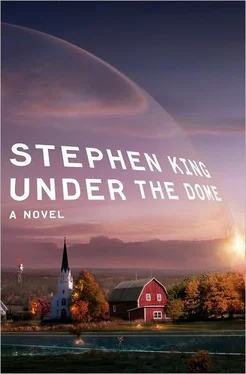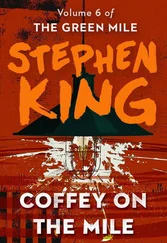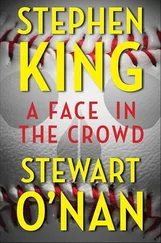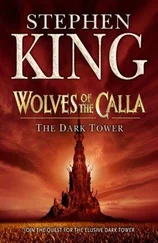Her hand had gone to her throat. “How much damage? Barbie, we have no firetrucks!”
“I’m sure they’ll have fire equipment standing by. As to how much damage?” He shrugged. “The whole area will have to be evacuated, that’s for sure.”
“Is it wise? Is what they’re planning wise?”
“It’s a moot question, Mrs.—Brenda. They’ve made their decision. But it gets worse, I’m afraid.” And, seeing her expression: “For me, not the town. I’ve been promoted to Colonel. By Presidential order.”
She rolled her eyes. “How nice for you.”
“I’m supposed to declare martial law and basically take over Chester’s Mill. Won’t Jim Rennie enjoy hearing that?”
She surprised him by bursting into laughter. And Barbie surprised himself by joining her.
“You see my problem? The town doesn’t have to know about me borrowing an old Geiger counter, but they do need to know about the bunker-buster coming their way. Julia Shumway will spread the news if I don’t, but the town fathers ought to hear it from me. Because—”
“I know why.” Thanks to the reddening sun, Brenda’s face had lost its pallor. But she was rubbing her arms absently. “If you’re to establish any authority here… which is what your superior wants you to do…”
“I guess Cox is more like my colleague now,” Barbie said.
She sighed. “Andrea Grinnell. We’ll take this to her. Then we’ll talk to Rennie and Andy Sanders together. At least we’ll outnumber them, three to two.”
“Rose’s sister? Why?”
“You don’t know she’s the town’s Third Selectman?” And when he shook his head: “Don’t look so chagrined. Many don’t, although she’s held the job for several years. She’s usually little more than a rubber-stamp for the two men—which means for Rennie, since Andy Sanders is a rubber-stamp himself—and she has… problems… but there’s a core of toughness there. Or was.”
“What problems?”
He thought she might keep that to herself too, but she didn’t. “Drug dependency. Pain pills. I don’t know how bad it is.”
“And I suppose she gets her scrips filled at Sanders’s pharmacy.”
“Yes. I know it’s not a perfect solution, and you’ll have to be very careful, but… Jim Rennie may be forced by simple expediency to accept your input for a while. Your actual leadership?” She shook her head. “He’ll wipe his bottom with any declaration of martial law, whether it’s signed by the President or not. I—”
She ceased. Her eyes were looking past him, and widening.
“Mrs. Perkins? Brenda? What is it?”
“Oh,” she said. “Oh, my God. ”
Barbie turned to look, and was stunned to silence himself. The sun was going down red as it often did after warm, fair days unsullied by late showers. But never in his life had he seen a sunset like this one. He had an idea the only people who ever had were those in the vicinity of violent volcanic eruptions.
No, he thought. Not even them. This is brand new.
The declining sun wasn’t a ball. It was a huge red bowtie shape with a burning circular center. The western sky was smeared as if with a thin film of blood that shaded to orange as it climbed. The horizon was almost invisible through that blurry glare.
“Good Christ, it’s like trying to look through a dirty windshield when you’re driving into the sun,” she said.
And of course that was it, only the Dome was the windshield. It had begun to collect dust and pollen. Pollutants as well. And it would get worse.
We’ll have to wash it, he thought, and visualized lines of volunteers with buckets and rags. Absurd. How were they going to wash it forty feet up? Or a hundred and forty? Or a thousand?
“This has to end,” she whispered. “Call them and tell them to shoot the biggest missile they can, and damn the consequences. Because this has to end.”
Barbie said nothing. Wasn’t sure he could have spoken even if he had something to say. That vast, dusty glare had stolen his words. It was like looking through a porthole into hell.
Jim Rennie and Andy Sanders watched the weird sunset from the steps of the Bowie Funeral Home. They were due at the Town Hall for another “Emergency Assessment Meeting” at seven o’clock, and Big Jim wanted to be there early to prepare, but for now they stood where they were, watching the day die its strange, smeary death.
“It’s like the end of the world.” Andy spoke in a low, awestruck voice.
“Bull-pucky!” Big Jim said, and if his voice was harsh—even for him—it was because a similar thought had been going through his own mind. For the first time since the Dome had come down, it had occurred to him that the situation might be beyond their ability to manage— his ability to manage—and he rejected the idea furiously. “Do you see Christ the Lord coming down from the sky?”
“No,” Andy admitted. What he saw were townspeople he’d known all his life standing in clumps along Main Street, not talking, only watching that strange sunset with their hands shading their eyes.
“Do you see me ?” Big Jim persisted.
Andy turned to him. “Sure I do,” he said. Sounding perplexed. “Sure I do, Big Jim.”
“Which means I haven’t been Raptured,” Big Jim said. “I gave my heart to Jesus years ago, and if it was End Times, I wouldn’t be here. Neither would you, right?”
“Guess not,” Andy said, but he felt doubtful. If they were Saved—washed in the Blood of the Lamb—why had they just been talking to Stewart Bowie about shutting down what Big Jim called “our little business”? And how had they gotten into such a business to start with? What did running a meth factory have to do with being Saved?
If he asked Big Jim, Andy knew what the answer would be: the ends sometimes justify the means. The ends in this case had seemed admirable, once upon a time: the new Holy Redeemer Church (the old one had been little more than a clapboard shack with a wooden cross on top); the radio station that had saved only God knew how many souls; the ten percent they tithed—prudently, the contribution checks issued from a bank in the Cayman Islands—to the Lord Jesus Missionary Society, to help what Pastor Coggins liked to call “the little brown brothers.”
But looking at that huge blurry sunset that seemed to suggest all human affairs were tiny and unimportant, Andy had to admit those things were no more than justifications. Without the cash income from the meth, his drugstore would have gone under six years ago. The same with the funeral home. The same—probably, although the man beside him would never admit it—with Jim Rennie’s Used Cars.
“I know what you’re thinking, pal,” Big Jim said.
Andy looked up at him timidly. Big Jim was smiling… but not the fierce one. This one was gentle, understanding. Andy smiled back, or tried to. He owed Big Jim a lot. Only now things like the drugstore and Claudie’s BMW seemed a lot less important. What good was a BMW, even one with self-parking and a voice-activated sound system, to a dead wife?
When this is over and Dodee comes back, I’ll give the Beemer to her, Andy decided. It’s what Claudie would have wanted.
Big Jim raised a blunt-fingered hand to the declining sun that seemed to be spreading across the western sky like a great poisoned egg. “You think all this is our fault, somehow. That God is punishing us for propping up the town when times were hard. That’s just not true, pal. This isn’t God’s work. If you wanted to say getting beat in Vietnam was God’s work—God’s warning that America was losing her spiritual way—I’d have to agree with you. If you were to say that nine-eleven was the Supreme Being’s response to our Supreme Court telling little children they could no longer start their day with a prayer to the God Who made them, I’d have to go along. But God punishing Chester’s Mill because we didn’t want to end up just another moribund wide spot in the road, like Jay or Millinocket?” He shook his head. “Nosir. No.”
Читать дальше











